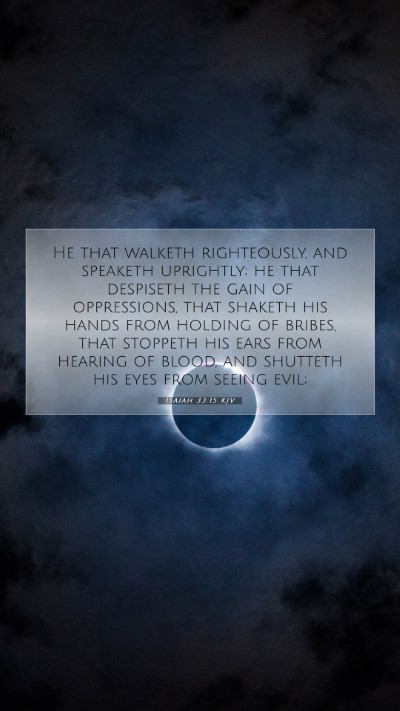Understanding Isaiah 33:15
Bible Verse: Isaiah 33:15 – "He who walks righteously and speaks uprightly, who despises the gain of oppressions, who shakes his hands, so that they hold no bribe, who stops his ears from hearing of bloodshed and shuts his eyes from seeing evil."
Overview of Isaiah 33:15
This verse provides a description of the character of the righteous man in the sight of God. It encapsulates the traits that define a life devoted to integrity, justice, and moral steadfastness, contrasting sharply with the corrupt practices of the wicked.
Bible Verse Meanings
In seeking to understand this scripture, it is essential to explore its different aspects, as interpreted by noted commentators.
- Matthew Henry: Henry emphasizes that righteousness is not merely an internal quality but is expressed through action and speech. The righteous man actively rejects corruption, detailing a life marked by ethical choices.
- Albert Barnes: Barnes highlights the importance of integrity, suggesting that the righteous man is one who is careful about his associations and actions. He interprets the acts of ‘shaking hands’ and ‘stopping ears’ as symbolic gestures against complicity in wrongdoing.
- Adam Clarke: Clarke provides an analysis that delves into the social and ethical dimensions of this righteousness. He notes that true righteousness requires not just personal virtue but a community commitment to justice and moral standards.
Detailed Bible Verse Explanations
This verse serves as a moral template for those seeking to live a life aligned with divine expectations. It emphasizes:
- Righteous Walk: The verse begins with the assertion that one must ‘walk righteously’; this implies a continuous, active state of living according to God’s commands.
- Upright Speech: The emphasis on ‘speaking uprightly’ indicates that words matter, reflecting one's moral character and integrity.
- Rejection of Corruption: The phrases regarding despising oppression and rejecting bribery highlight the responsibility to reject unethical gains and practices actively.
- Awareness of Evil: The act of ‘stopping ears’ and ‘shutting eyes’ points to an important moral choice: to not participate in or even witness evil actions significantly marks the righteous person's integrity.
Biblical Exegesis
For a deeper understanding, we can analyze the context in which the verse is situated. Isaiah 33 addresses God's judgment on the wicked and His protection of the righteous.
Thus, this verse not only serves as an ethical guide but also reinforces the overarching theme of God's justice. The righteous are promised safety amid turmoil, indicating the rewards of moral living in line with God’s standards.
Application in Daily Life
When applying the teachings of Isaiah 33:15, readers can consider the ways in which they can embody righteousness:
- Personal Integrity: Commit to living a life that reflects honesty, transparency, and a rejection of unethical behavior.
- Community Engagement: Take active steps in community justice, standing against oppression and aiding those in need.
- Moral Awareness: Cultivate an awareness of the issues around you, making deliberate choices to avoid situations that compromise your values.
Cross References
To fully grasp the implications of Isaiah 33:15, consider the following cross-references:
- Psalm 15:2: "He who walks uprightly and works righteousness, and speaks the truth in his heart."
- Proverbs 10:9: "He who walks in integrity walks securely, but he who makes his ways crooked will be found out."
- Matthew 5:8: "Blessed are the pure in heart, for they shall see God."
Key Concepts
This scripture invites us to reflect on a variety of themes deeply rooted in biblical principles:
- Integrity: Both in actions and words, embodying truthfulness.
- Justice: Actively opposing oppression and standing for the marginalized.
- Moral Choice: The conscious decision to refrain from being a part of evil.
Conclusion
Isaiah 33:15 serves as a profound reminder of the characteristics of those who seek to live righteously in a world fraught with challenges. By embodying these values in daily life, we align ourselves with God's will and reflect His light in the world.
In every Bible study session or individual reflection, let this verse guide not just understanding but practical application, enabling us to be agents of righteousness in our communities.


